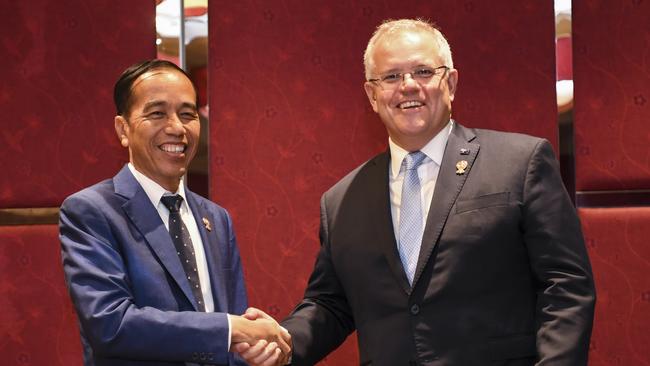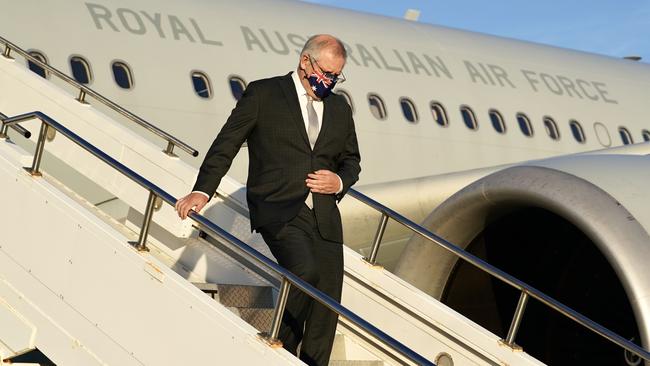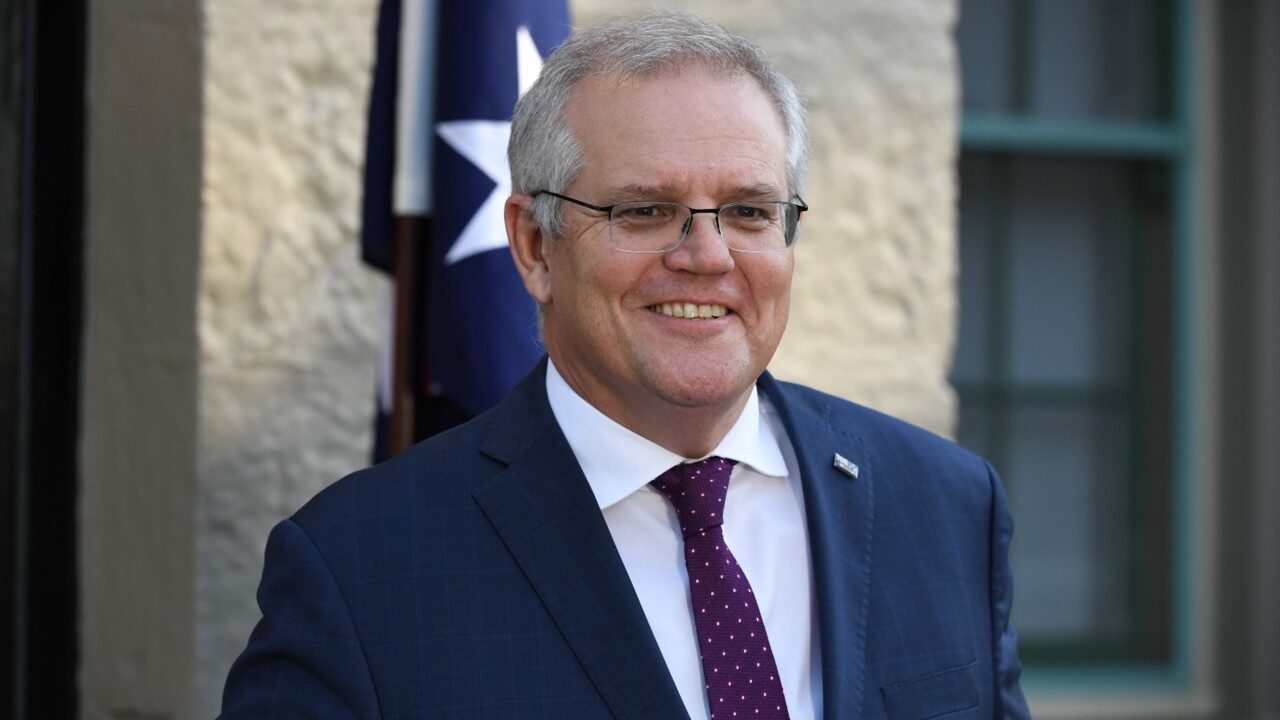AUKUS alliance: Move to ease ASEAN concerns over subs
Australia has moved to reassure its Southeast Asian neighbours that its new security alliance with Britain and the US will not seek to dominate regional geopolitics.

Scott Morrison is continuing to try and mend regional and European relations over the sudden announcement of the new Australian, United Kingdom and United States (AUKUS) defence partnership and nuclear submarine deal.
Enroute to New York the Prime Minister spoke to Indonesian President Widodo and reassured him the new trilateral agreement would help “provide peace and stability in the region”.
Mr Morrison said the new agreement and Australia’s acquisition of nuclear submarines would aid “a strategic balance in the region”.
An Australian team to explain the new arrangements and provide greater detail will be dispatched in Jakarta within two weeks.
Mr Morrison reassured President Widodo that Australia would keep all its obligations under the nuclear non-proliferation agreements. Facing a furious reaction to the cancellation of the $90 billion French diesel submarine contract and attempts to derail the Australian European Union free trade talks Mr Morrison is also reaching out to European national and institutional leaders in official meetings in New York in the first working day of the five-day trip including NATO and the European Commission.
Mr Morrison will also begin the tour with a formal bilateral meeting in New York with US President Joe Biden.

Australia has moved to reassure its Southeast Asian neighbours that its new security alliance with Britain and the US will not seek to dominate regional geopolitics, and that it remains committed to nuclear non-proliferation amid heightened fears the AUKUS pact could trigger an arms race.
Indonesia and Malaysia – two of our most important neighbours – have expressed concerns over Canberra’s plan to acquire a fleet of nuclear-powered submarines, fearing it is an inevitable prelude to Australia acquiring nuclear weapons. Singapore has also been cautious in its response.
On Monday, North Korea also warned of a potential “chain reaction of arms races” as a result of the trilateral pact that it described as “extremely undesirable and dangerous acts which will upset the strategic balance in the Asia-Pacific region”.
Pyongyang would take “corresponding counteraction in case it has even a little adverse impact on the security” on the country, a foreign ministry official told the Korean Central News Agency, adding the deal would destroy “regional peace and security and the international non-proliferation system”.
The comments will only add to regional concern that the pact further raises the temperature in the hotly-contested South China Sea, over which the 10-member Association of Southeast Asian Nations is the leading multilateral body.
“This new agreement does not change Australia’s commitment to ASEAN,” Australia’s ambassador to ASEAN, Will Nankervis, said on Monday, emphasising Canberra’s “staunch support” for the Non-Proliferation Treaty. But “as a three-ocean nation dependent on seaborne international trade, our naval capabilities are vital to Australia”, he said.
“We are committed to continuing to foster a peaceful, secure region with ASEAN at its centre, and to complementing and strengthening the existing ASEAN-led architecture.
“While these submarines will be nuclear-powered, they will not carry nuclear weapons. Australia does not and will not seek such weapons. Nor do we seek to establish a civil nuclear capability.”
Mr Nankervis’s statement is a clear acknowledgment of the regional unease triggered by last week’s announcement, which has also heightened ASEAN paranoia at a time it was already feeling threatened by the growing clout of the Quad grouping of Australia, Japan, India and the US.
An adviser to Indonesian President Joko Widodo’s office, Andi Widjojanto, told Tempo Magazine on Monday that the AUKUS pact would be a consideration in determining the next Indonesian National Armed Forces chief.
“There are new tensions related to the AUKUS, a nuclear-powered submarine, with the Chinese military in the South China Sea. That is an aspect of the global order that the President will consider,” he said.

The level of concern in Jakarta has reportedly prompted the senior advisory group of the Indonesia-Australia Defence Alumni Association (IKAHAN) – includes former chief of army Lieutenant-General Peter Leahy and former defence force chief Air Chief Marshal Sir Angus Houston – to organise a virtual meeting in coming daysto talk through the issues.
James Chin, a professor of Asian Studies at the University of Tasmania, said ASEAN states were “already very worried about the China-US rivalry playing out in their backyard”. “The new AUKUS agreement reinforces the idea that the opinions of the ASEAN members matter little when it comes to the superpowers and how they operate in the region,” he said.
Labor has also accused Scott Morrison of failing the diplomacy test as France escalated its criticism of Canberra for reneging on its $90bn submarines contract.
Opposition foreign affairs spokeswoman Penny Wong said the Prime Minister’s fixation on making announcements had contributed to the diplomatic fallout, and that France should not have been blindsided by the decision.
“What we see again is announcement first, focus on domestic announcement, with insufficient regard being had by the leader of the country to how this positions Australia with other partners,” she told ABC radio.
Ambassador Jean Pierre Thebault, who was recalled to Paris over the decision, said Mr Morrison kept France in the “dark intentionally until the last minute”.
“The question seems to be only did we get the call one hour or four hours before the announcement,” Mr Thebault told ABC Radio National on Monday.
“Trusted partners … don’t behave like that. It’s a question of principle, it’s a question of dignity and mutual respect in relations between states.”
He said Mr Morrison had given no signal the deal was in jeopardy when he discussed it with his French counterpart in June.
“This is not an Australian attitude towards friends, and maybe we’re not friends,” he added.
France has now asked its fellow Europeans to “reconsider” the EU-Australia free-trade deal.
Ahead of his trip to Europe to discuss the trade deal on October 12, Trade Minister Dan Tehan said it was in the “mutual interest” of both parties for talks to continue.



To join the conversation, please log in. Don't have an account? Register
Join the conversation, you are commenting as Logout